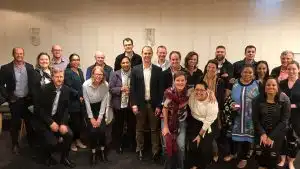OBE Organic is proud to be just the fourth Australian agribusinesses to develop a Reconciliation Action Plan (RAP).
Most RAPs seem to be the domain of big companies and government departments. We’re a small company of just 10 employees, so we’re happy to share our highs and lows you in the hope that other smaller businesses, especially in agribusiness, will take a look at how they can contribute to reconciliation.
Our 18-month experience is that RAPs challenge your thinking and like all plans need discipline to implement – but they’re not difficult, and they can make a real difference.
What is a RAP?
A RAP is a practical action plan for organisations to create social change and economic opportunities for Aboriginal and Torres Strait Islander peoples. To make it easy, Reconciliation Australia provides a template to develop RAPs that gradually increase in ambition each year as you build your skills and commitment.
We are still in the early stages of our RAP journey, but are making some encouraging progress.
What have we achieved?
Some of the initiatives we’ve delivered since we started our RAP in late 2017 are:
- Forming a Working Group to oversee our RAP implementation, including two Aboriginal women who provide invaluable advice and support along our journey, and the two most senior executives at OBE Organic
- Raising our employee’s cultural awareness of Aboriginal and Torres Strait Islander peoples and pride in their culture; awareness of simple but meaningful topics like local Traditional Owners and the historical events that mark National Reconciliation Week increased significantly in the first year
- Building relationships with other organisations to share our RAP experiences and ideas, such as the Indigenous Land Corporation
- Hosting about 60 industry influencers and OBE Organic staff at two screenings of Gurrumul to generate more of a conversation about reconciliation in a ‘safe space’
- Advocating widely for other agribusinesses to adopt a RAP, including directly to industry leaders and via interviews, presentations and in media
- Developing draft strategies to support Indigenous employment and procurement.
What have we learnt?
- Be prepared to learn. Our knowledge is not as high as it should be, but our intent is positive, and we want to improve and make a genuine contribution to reconciliation. We need to recognise we are on a journey, we may make (inadvertent) mistakes, and we have much to learn.
- Be prepared to commit. Implementing a RAP, like all plans, doesn’t just happen. Targets have to be set, progress regularly reviewed, and people held accountable.
- Reconciliation builds a better business. Our RAP requires us to develop strategies to promote indigenous employment. Taking a critical look at how we can make our company more welcoming for indigenous employees will make our company more welcoming for all employees – an outcome which will strengthen our overall business.
- People are interested in more than the quality of our organic beef. We work hard to ensure our organic beef is produced sustainably and our animals are raised humanely, but our customers and stakeholders are also asking us to demonstrate more about how we interact with and care for our people both up and down our supply chain. They want us to be more transparent. A RAP is one way of demonstrating our intent.
Where to from here? We’re currently working with Reconciliation Australia to endorse our second RAP, and work towards the reconciliation vision our employees have developed:
Our vision for reconciliation is an Australia that proudly embraces Indigenous culture as integral to our national identity. An Australia that does this will instinctively recognise past wrongs and include Indigenous people in all aspects of our society. For OBE Organic to play our role in this vision, we will work to build respect, relationships and opportunity in our business, in our supply chain, and in our industry.
You can read our first-year RAP here.









